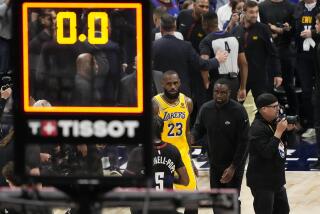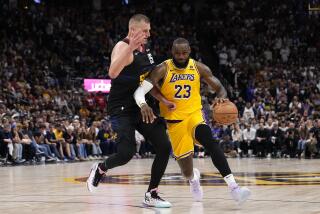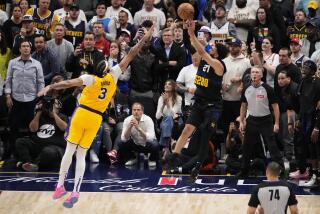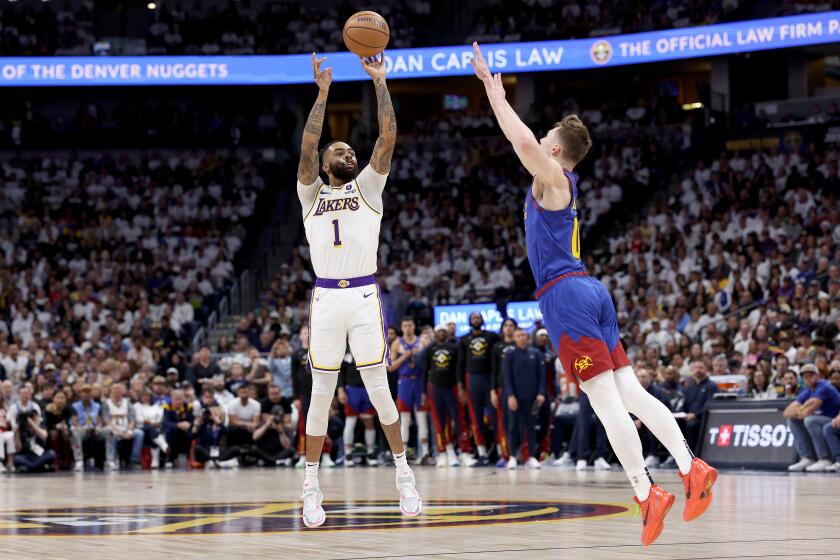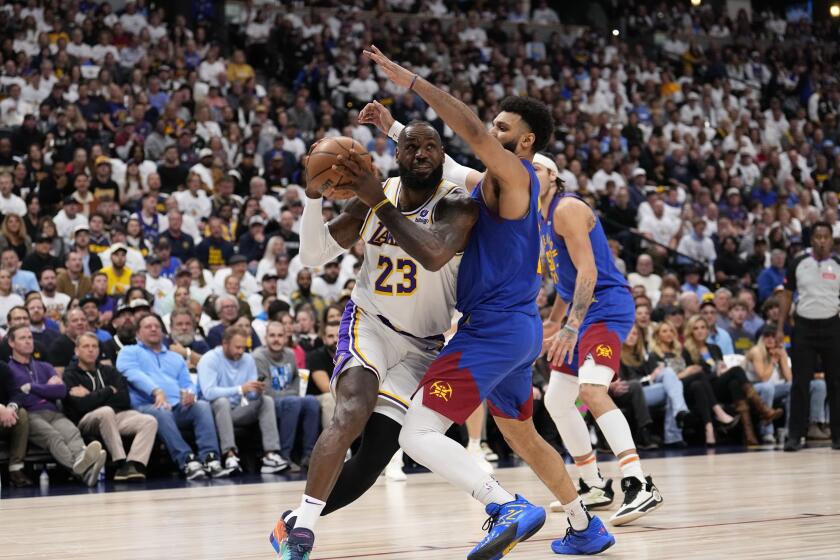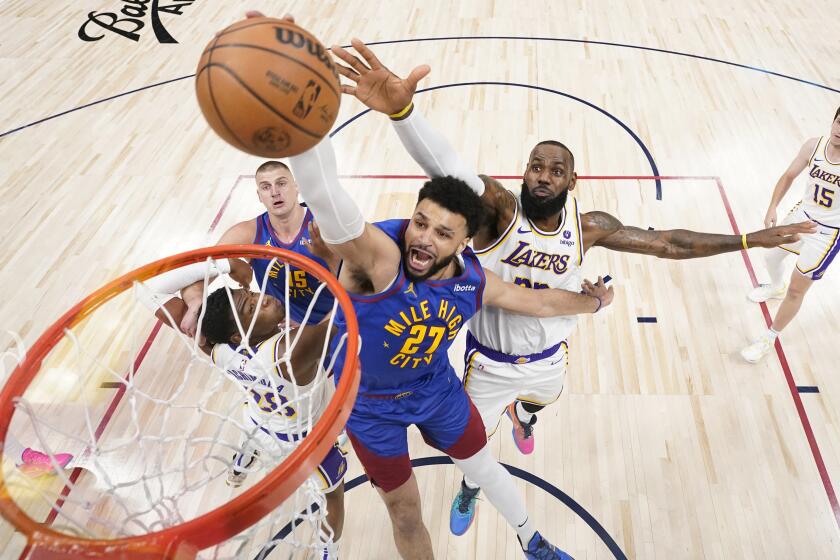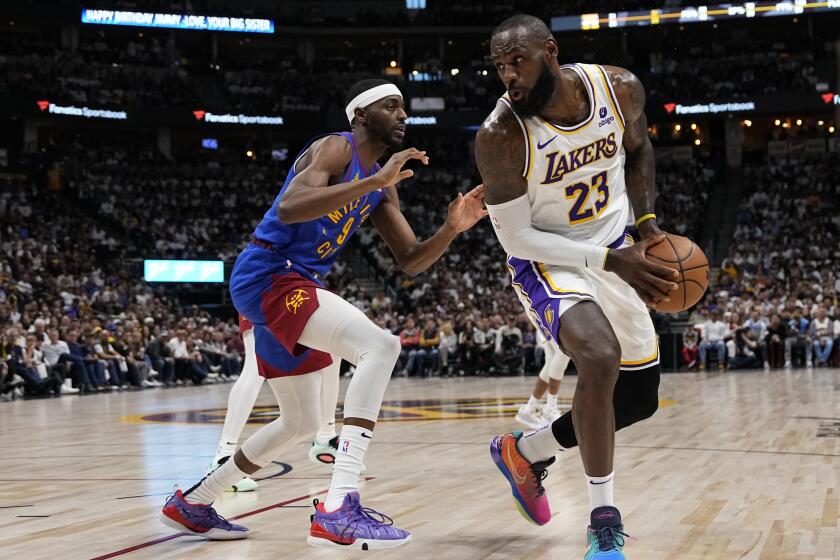One cancer survivor’s answer to chemo? Lakers
When I entered Catherine Royer’s house, she greeted me with a hug, a sweet smile and a warm cup of chamomile tea. She is gentle and effervescently warm until tipoff of a Lakers game.
Once the ball leaves the referee’s hands, her eyes become impassioned and the outside world ceases to exist. Phones ring unanswered, family conversations in the another room are unheard and I sip my tea unnoticed.
Royer is completely absorbed in the unfolding drama of every Lakers game. She vigorously waves her hands when they score, and winces when they don’t.
Tonight, she is not wearing her Lamar Odom jersey. But during a recent game when the Lakers fell behind, she rushed to her bedroom, put on her Odom jersey, cheered with raucous intensity, and an hour later they won the game. On this night, however, the Lakers are ahead and her jersey is neatly stored in her bureau.
She is a cancer survivor. The Lakers helped Royer in a way Western medicine could not, she said. They made her happy. Without speaking, they talked to her. Without touching her, they lifted her to a higher plane of existence.
Throughout her frightening, painful and exhausting ordeal of chemotherapy, mastectomy surgery and radiation treatments, she turned to them.
Royer, a 66-year-old social worker, was diagnosed with breast cancer in December 2005. She started intensive chemotherapy twice a month. Weakened by the treatments, and despondent over losing her hair, she felt nauseated, was suffering from numbness in her arms and legs and had lost 15 pounds.
Royer was not an avid sports fan. But her husband, Bill Royer, thought she needed a distraction, so he had cable TV installed in the bedroom of their Brentwood home.
“Initially, I started watching Laker games because it was convenient. I wasn’t interested in sitcoms,” she said. What began as tepid interest transformed into a full-blown addiction. The Lakers’ problems and successes became a key part of her world, and the team became a vicarious, second family.
When Odom’s infant son died in the summer of 2006, she felt sadness for his family. When rookie Ronny Turiaf underwent open-heart surgery and then made his Lakers debut six months later, she felt great pride in his accomplishment. When Kobe Bryant last spring said that he wanted to be traded, she was dismayed.
Royer says focusing on the team helped her get out of her sickbed. “I began organizing my life around the games. Basketball distanced me from my cancer. When the players are playing they have to be totally focused in the moment; so too does a fan,” she said.
During her chemotherapy, she developed appendicitis. She asked her doctor to schedule the operation so she could watch the Lakers game that night.
“Basketball kept my mom happy. It gave her something to look forward to,” said Mollie Royer, her 23-year-old daughter.
Within the medical community, there’s considerable debate over whether patients can will themselves to heal.
“There is no data to support [the idea] that having a positive attitude heals cancer, but having a positive attitude can help a cancer patient feel healed,” said Anne Coscarelli, director of Simms/Mann UCLA Center for Integrative Oncology at UCLA’s Jonsson Comprehensive Cancer Center.
Coscarelli added that encouraging patients to maintain a positive attitude can be detrimental to their health. That’s because patients can blame themselves if they feel sad or scared.
“It’s more important for patients to have an authentic experience than a positive experience,” she said.
Steve P. Lee, intern chairman and associate professor of radiation and oncology at UCLA, agrees that it’s hard to find concrete scientific evidence to support the theory that having a positive attitude helps heal cancer patients.
“Doctors who see patients would agree that patients who have a positive attitude do better. If a person has a positive attitude they are more likely to be able to cope with the side effects of chemotherapy, radiation therapy and surgery,” Lee said. “And these treatments save lives.”
During her cancer treatments, Royer worked at the Veterans Administration in Westwood helping people with substance abuse, dementia and geriatric problems.
She said her newfound passion for the Lakers helped improve her rapport with her primarily elderly African American clientele.
“We could discuss the Lakers and laugh. They were surprised that this old, white lady knew so much about basketball,” she said.
Since becoming a Lakers fan, she has attended two games. But she prefers watching games on TV because the camera close-ups show the players’ emotions.
Royer said her doctor believes that the cancer is gone. Even though she no longer needs the Lakers as she once did, her devotion to them remains as strong as ever. At the moment, she is worried about Andrew Bynum’s knee injury.
Bynum, of course, has no knowledge of this former cancer patient who is vehemently hoping for his speedy recovery.
Royer said she doesn’t care. For her, the relationship with the Lakers is real, even if this awareness is only from her end. Being a fan requires a certain noble anonymity.
More to Read
All things Lakers, all the time.
Get all the Lakers news you need in Dan Woike's weekly newsletter.
You may occasionally receive promotional content from the Los Angeles Times.
